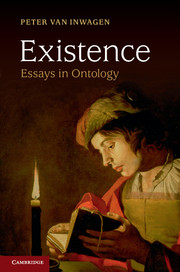Book contents
- Frontmatter
- Contents
- Preface
- Introduction: inside and outside the ontology room
- Chapter 1 Five questions
- Chapter 2 The new antimetaphysicians
- Chapter 3 Being, existence, and ontological commitment
- Chapter 4 Existence, ontological commitment, and fictional entities
- Chapter 5 Can variables be explained away?
- Chapter 6 Quine's 1946 lecture on nominalism
- Chapter 7 Alston on ontological commitment
- Chapter 8 A theory of properties
- Chapter 9 What is an ontological category?
- Chapter 10 Relational vs. constituent ontologies
- Chapter 11 Can mereological sums change their parts?
- Chapter 12 Causation and the mental
- Index
- References
Chapter 12 - Causation and the mental
Published online by Cambridge University Press: 05 June 2014
- Frontmatter
- Contents
- Preface
- Introduction: inside and outside the ontology room
- Chapter 1 Five questions
- Chapter 2 The new antimetaphysicians
- Chapter 3 Being, existence, and ontological commitment
- Chapter 4 Existence, ontological commitment, and fictional entities
- Chapter 5 Can variables be explained away?
- Chapter 6 Quine's 1946 lecture on nominalism
- Chapter 7 Alston on ontological commitment
- Chapter 8 A theory of properties
- Chapter 9 What is an ontological category?
- Chapter 10 Relational vs. constituent ontologies
- Chapter 11 Can mereological sums change their parts?
- Chapter 12 Causation and the mental
- Index
- References
Summary
I have some rather extreme ideas about ontology – and when I say this, I’m not alluding to the ideas about tables and chairs and organisms that the phrase ‘van Inwagen's extreme ideas about ontology’ would no doubt suggest to many philosophers. I’m alluding rather to certain ideas I have that belong to the most abstract (and the most abstruse) part of ontology, the part that pertains to the concepts of substance and attribute and the relations between them.
I have some very odd ideas about causation – notice that I distinguish the extreme from the very odd in the realm of ideas – and some very odd ideas about the relation between the mental and the physical. (Or perhaps I should say “about the traditional opposition between the mental and the physical,” since the phrase ‘the relation between the mental and the physical’ suggests something having to do with causation, and the odd ideas I’m alluding to are not ideas about the way the mental and the physical are causally related.)
Information
- Type
- Chapter
- Information
- ExistenceEssays in Ontology, pp. 238 - 258Publisher: Cambridge University PressPrint publication year: 2014
References
Accessibility standard: Unknown
Why this information is here
This section outlines the accessibility features of this content - including support for screen readers, full keyboard navigation and high-contrast display options. This may not be relevant for you.Accessibility Information
- 1
- Cited by
